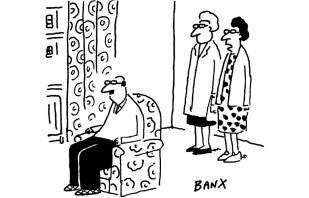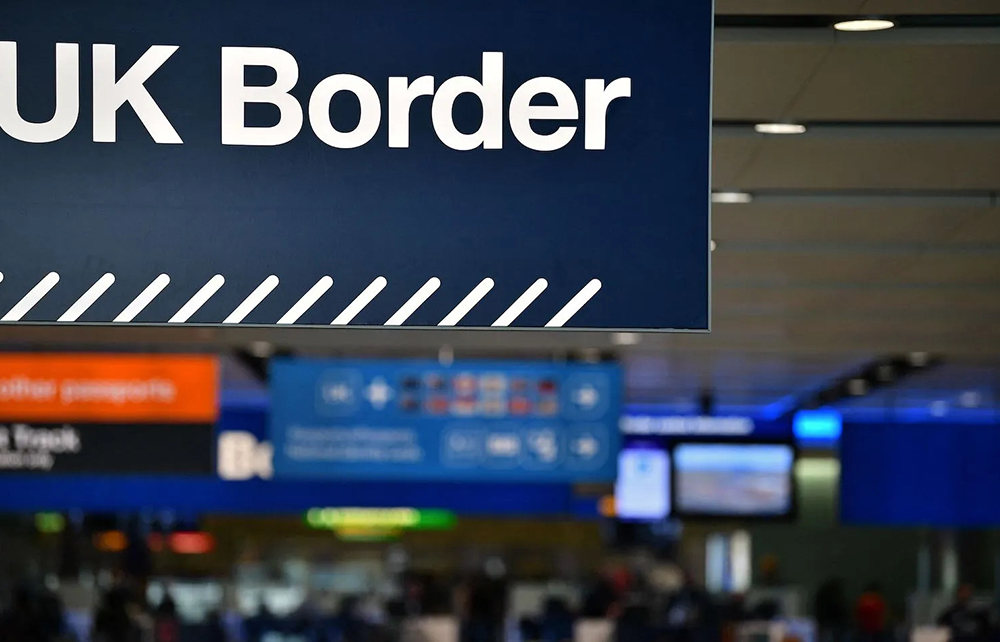Way back in the long distant 1990s, net migration into this country used to be in the tens of thousands each year. There was no lack of discussion about that, but we were not yet in the ‘dependency’ period of migration: that is, when people routinely said we had to have migration because otherwise who would do the menial jobs that we Brits didn’t want to do? You know, things like work in the NHS, work in restaurants, clean. That sort of thing.
The small boats in the Channel are the most visible symbol of the system being broken
Then the Blair government came in, sent annual immigration into the hundreds of thousands and everything changed. There is a dispute among partisans over whether that government lost control of immigration or had a deliberate policy to transform the UK. It seems to have been a bit of both, with people like the immigration minister Barbara Roche intent on the latter, and occasional wiser heads wondering whether it was such a good idea but not knowing which levers to pull.
Either way, by the mid-2000s we were in the dependency phase of mass migration. Those who were for it, or who excused it, simultaneously said that it solved the problem of the jobs the locals wouldn’t do and also that the people who were arriving were mainly brain surgeons. Migrants were never middle-class, apparently, only rocket scientists or street sweepers. Nothing in between.
One of the principal reasons people voted to leave the EU in 2016 was because the public had – rightly – got the idea that all of this was out of our control unless we exited the bloc. For years, those in both the Labour and Conservative parties liked to make this point: that the EU effectively tied their hands. So we left the EU – and net migration numbers into the UK actually increased. That’s the problem with always blaming another party, even if it has some truth to it. Nothing is ever simply the fault of something else – it is also your responsibility to fix on the other side. As usual, the Tory party gave us the rhetoric they thought we wanted, misjudged though it often was, as in Theresa May’s ugly attempts to capture what she imagined to be the public mood. But the facts belied the rhetoric as surely as they had in the New Labour years, when Phil Woolas or some other minister would be sent out to talk tough, only for the figures to continue rocketing.
Last year net migration to the UK hit a staggering 500,000. Various factors were offered to explain it. The effects of lockdowns lifting. The war in Ukraine. The Hong Kong nationals. But migration is like markets. ‘Once in a generation’ events are always used as an excuse by managers who can’t blame anything else. Besides, ‘once in a generation’ events now happen several times each year.
The small boats in the Channel are the most visible symbol of the system being broken. But the tens of thousands coming across this way are the mere tip of the issue. The hundreds of thousands coming in by plane are what make the historic highs.
I can already hear the typical objections to this – the usual, addled, Golem-like complaint: ‘We needs it.’ And the people who say this never contend with the flip-side – which is that if you import your working class, then what happens to your working class? One answer is that a significant portion put their feet up.
Officially, unemployment figures in the UK are relatively low – somewhere in the region of 1,293,000 (or 2.4 per cent of the adult population), according to the Office for National Statistics. But as The Spectator has proven in face of considerable outside opposition, what this ignores are the five million people in this country on benefits who for various reasons are deemed to be unsuited to work. These are people of working age, remember.
Conservative governments have been trying to address this section of people for a good decade or more. Iain Duncan Smith and others made some inroads into it. But that (actually over) five million figure remains – a great block who cannot or will not work.
The left would like to pretend that all of these people are suffering from debilitating disease, at risk at any moment of having pins thrust in their legs by Conservative minions and then being hurled on to the factory floor. It is a fantasy, not least because we have the figures for incapacity benefits and they account for a fraction of the five million.
But let us pretend for a moment that what the defenders of the status quo say is true. If it was true, then are there not questions to ask? What is this plague that has blighted some of our biggest cities? What is this wasting disease that means that one in five people of working age in Liverpool, Birmingham and Manchester – to name just a few cities – are claiming out of work benefits? And why are half a million people coming into this country each year to do jobs which these people won’t do?
I have long argued that mass migration – as opposed to limited migration – damages a country for two reasons. First, it allows the immobilisation of a percentage (quibble over that number as you will) of the local population, who will find certain jobs beneath them. Second, it allows the country to change beyond all recognition.

The more I look at the UK, the more it seems to me to have changed utterly. Is all of that change bad? No. But is all of it good? Definitely not. There remain pockets of the country that are recognisable, but the idea that we any longer have a coherent country, with a coherent set of values, ideas or beliefs, disappeared years ago. We are a collection of communities. Buy your way into one of the richer ones and you can still have a wonderful life – even a recognisable one. Fail to get your crampons into that and you will have to live in the confused mêlée that a generation of politicians has cast you into.
And still some people say politicians make nothing happen.







Comments